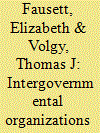|
|
|
Sort Order |
|
|
|
Items / Page
|
|
|
|
|
|
|
| Srl | Item |
| 1 |
ID:
113812


|
|
|
|
|
| Publication |
2012.
|
| Summary/Abstract |
Over recent decades a judicialization process of international dispute settlement procedures has taken place. Yet, the judicialization of procedures remains meaningless if the procedures are not used and accepted by disputing states in practice. Prominent theoretical approaches point to different conditions under which this is to be expected. Realism emphasizes the international distribution of power, institutionalism stresses the importance of the institutional design of international dispute settlement procedures, and liberalism points to the domestic institutional setting of the participating states. The article confronts these theoretical expectations with states' actual dispute settlement behavior in the international trade regime, the United Nations Security Council, the European human rights regime and the regime on the protection of endangered species in the 1970s/80s and 1990s/2000s, respectively. Its main finding is that, compared to realism and liberalism, institutionalism fares better in explaining the judicialization of states' dispute settlement behavior.
|
|
|
|
|
|
|
|
|
|
|
|
|
|
|
|
| 2 |
ID:
095378


|
|
|
|
|
| Publication |
2010.
|
| Summary/Abstract |
Does membership in Intergovernmental Organizations (IGOs) affect states' human rights behavior? One might expect IGOs with a specific human rights mandate, like the International Labour Organization or the Council of Europe, to have a positive effect on the human rights practices of their member states. But what about other sorts of IGOs, particularly those with no direct connection to human rights issues? This study employs cross-national data on abuses of "physical integrity rights" for 137 countries over the period 1982-2000 to test the hypothesis that IGOs can promote the diffusion of human rights norms by providing venues for interstate socialization. Recent empirical work on IGOs has suggested that this sort of socialization effect can play an important role in promoting democracy and can also lead to a more general convergence among states' interests. The results presented here suggest that IGOs can have a surprisingly powerful influence on states' human rights practices as a result of this process.
|
|
|
|
|
|
|
|
|
|
|
|
|
|
|
|
| 3 |
ID:
110813


|
|
|
|
|
| Publication |
2012.
|
| Summary/Abstract |
Growing interest in the social consequences of climate change has fueled speculation that global warming could lead to an increase in various forms of political violence. This article examines the effects of climate change on international conflict subsequent to the onset of European industrialization. Surprisingly, analysis at the system level suggests that global warming is associated with a reduction in interstate conflict. This naive relationship is suspect, however, as the increased consumption of carbon-based fuels is itself associated with changing patterns of politics and prosperity. In particular, economic development has been viewed as a cause of both climate change and interstate peace. Incorporating measures of development, democracy, cross-border trade, and international institutions reveals that systemic trends toward peace are actually best accounted for by the increase in average international income. The results imply that climate change, which poses a number of critical challenges for citizens and policymakers, need not be characterized as fundamentally a security issue, though climate change may have important security implications on the periphery of world politics. The analysis here also suggests that efforts to curb climate change should pay particular attention to encouraging clean development among middle-income states, as these countries are the most conflict prone. Ironically, stagnating economic development in middle-income states caused by efforts to combat climate change could actually realize fears of climate-induced warfare.
|
|
|
|
|
|
|
|
|
|
|
|
|
|
|
|
| 4 |
ID:
064658


|
|
|
| 5 |
ID:
095376


|
|
|
|
|
| Publication |
2010.
|
| Summary/Abstract |
While the relationship between intergovernmental organizations (IGOs) and conflict has captured the attention of international relations scholars for decades, the empirical results of this research agenda have presented contradictory conclusions regarding the pacifying effect normally attributed to IGOs. We address these contradictions by refocusing primarily on potential IGO effects on low-severity conflicts. We examine new states in the postcommunist space spanning Europe and Central Asia as a useful research site to explore these relationships in the post-Cold War era. We argue that especially in the case of newly emerging states, where there is little institutional memory and long-term experience in foreign affairs, IGOs expose differential policy preferences between members, and such information should be associated with the likelihood of increased low levels of conflict. We find a strong association between shared IGO membership and low severity conflict, a significant relationship between low and high severity conflict, and differences between IGO membership effects on low versus high severity conflict, consistent with our theoretical argument.
|
|
|
|
|
|
|
|
|
|
|
|
|
|
|
|
|
|
|
|
|